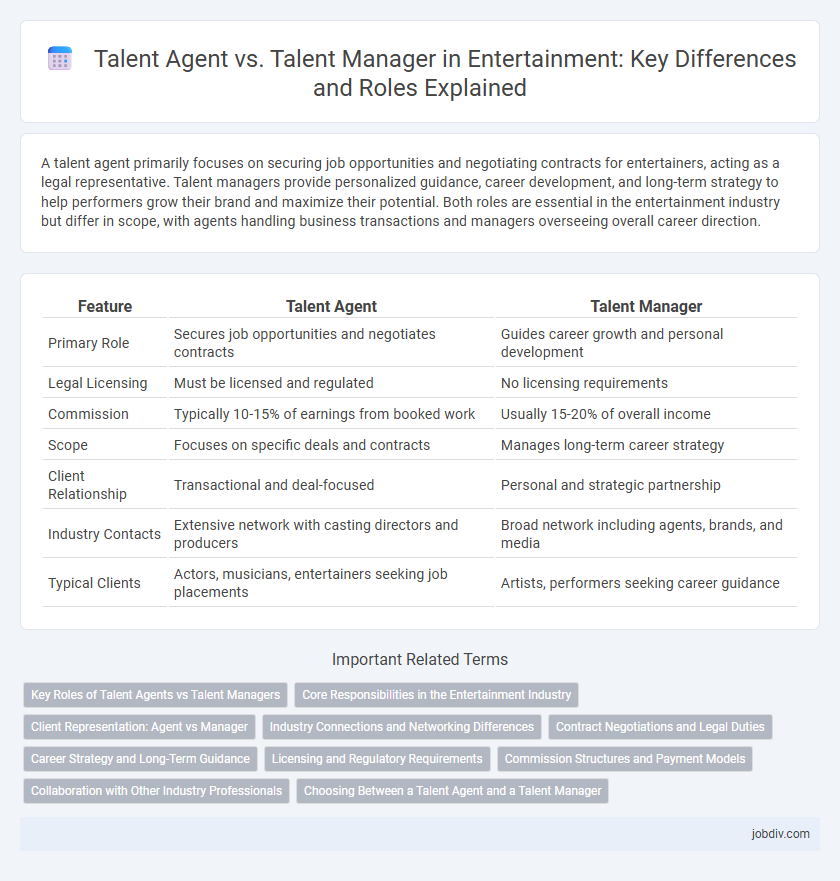A talent agent primarily focuses on securing job opportunities and negotiating contracts for entertainers, acting as a legal representative. Talent managers provide personalized guidance, career development, and long-term strategy to help performers grow their brand and maximize their potential. Both roles are essential in the entertainment industry but differ in scope, with agents handling business transactions and managers overseeing overall career direction.
Table of Comparison
| Feature | Talent Agent | Talent Manager |
|---|---|---|
| Primary Role | Secures job opportunities and negotiates contracts | Guides career growth and personal development |
| Legal Licensing | Must be licensed and regulated | No licensing requirements |
| Commission | Typically 10-15% of earnings from booked work | Usually 15-20% of overall income |
| Scope | Focuses on specific deals and contracts | Manages long-term career strategy |
| Client Relationship | Transactional and deal-focused | Personal and strategic partnership |
| Industry Contacts | Extensive network with casting directors and producers | Broad network including agents, brands, and media |
| Typical Clients | Actors, musicians, entertainers seeking job placements | Artists, performers seeking career guidance |
Key Roles of Talent Agents vs Talent Managers
Talent agents primarily focus on securing job opportunities and negotiating contracts for their clients, acting as official representatives to connect talent with casting directors, producers, and studios. Talent managers provide personalized career guidance, including brand development, long-term strategy, and day-to-day support, fostering professional growth beyond immediate project bookings. Both roles are essential in the entertainment industry, with agents handling transactional aspects and managers concentrating on overall career trajectory.
Core Responsibilities in the Entertainment Industry
Talent agents in the entertainment industry primarily focus on securing job opportunities, negotiating contracts, and connecting clients with casting directors, producers, and studios. Talent managers concentrate on long-term career development, personal branding, and strategic planning by advising artists on creative decisions and managing daily business affairs. Both roles collaborate closely to maximize an entertainer's marketability and professional growth.
Client Representation: Agent vs Manager
Talent agents are licensed professionals who legally represent clients by securing work contracts and negotiating deals in film, television, music, and theater industries. Talent managers provide personalized career guidance, focusing on long-term strategy, branding, and professional development without holding the same legal authority to negotiate contracts. While agents handle transactional aspects of client representation, managers invest in cultivating relationships and managing day-to-day career decisions to enhance overall success.
Industry Connections and Networking Differences
Talent agents possess extensive industry connections crucial for securing casting opportunities, negotiations, and contract deals within film, television, and theater sectors. Talent managers focus on building personalized networks that nurture long-term career growth, including relationships with producers, directors, and branding experts. While agents leverage formal industry affiliations for immediate job placements, managers cultivate deeper, strategic partnerships to develop an artist's overall market presence.
Contract Negotiations and Legal Duties
Talent agents specialize in contract negotiations, using their licensing and industry knowledge to secure favorable deals and commissions on behalf of clients, while talent managers focus on broader career development without direct involvement in contract legalities. Agents are legally authorized to negotiate and finalize contracts, ensuring compliance with union regulations and mitigating legal risks, contrasting with managers who offer strategic advice and personal guidance but typically do not have licensing for official negotiations. The distinction impacts legal duties, as agents bear fiduciary responsibilities tied to contract execution, whereas managers influence contracts indirectly through career management.
Career Strategy and Long-Term Guidance
Talent agents specialize in securing immediate opportunities such as auditions and contracts by leveraging industry connections, while talent managers focus on long-term career strategy by providing personalized guidance on brand development, image, and growth. Agents operate under strict regulations and typically earn commissions from secured jobs, whereas managers cultivate ongoing relationships to shape overall career trajectories and may have flexible compensation models. Both roles are crucial, but managers emphasize sustainable career planning and evolving talent positioning beyond individual gigs.
Licensing and Regulatory Requirements
Talent agents are often required to obtain state-specific licenses to legally negotiate contracts and secure work for clients, ensuring compliance with local entertainment laws. Talent managers typically operate under fewer licensing restrictions but must adhere to industry regulations regarding client representation and contractual obligations. Understanding these distinct regulatory frameworks is crucial for entertainers seeking professional guidance within the licensing landscape.
Commission Structures and Payment Models
Talent agents typically operate on a commission model charging around 10% of the artist's earnings from secured deals, ensuring payment is tied directly to job acquisition. Talent managers often negotiate a broader commission range between 15-20%, reflecting their involvement in career strategy, personal branding, and ongoing business development. Payment models for agents are usually deal-specific and regulated by industry standards, while managers may require retainer fees or percentage-based commissions covering various income streams beyond individual bookings.
Collaboration with Other Industry Professionals
Talent agents specialize in securing job opportunities by working closely with casting directors, producers, and networks, leveraging their industry connections for client placements. Talent managers focus on the long-term career development of artists by coordinating with publicists, lawyers, and brand partners to build a sustainable personal brand. Both roles require effective collaboration with entertainment professionals to maximize an artist's visibility and career growth.
Choosing Between a Talent Agent and a Talent Manager
Choosing between a talent agent and a talent manager depends on an entertainer's specific career needs and goals. Talent agents specialize in securing job opportunities, negotiating contracts, and connecting clients with casting directors, making them essential for immediate project placements. Talent managers provide broader career guidance, brand development, and long-term strategic planning, offering personalized support beyond contract negotiations.
Talent Agent vs Talent Manager Infographic

 jobdiv.com
jobdiv.com